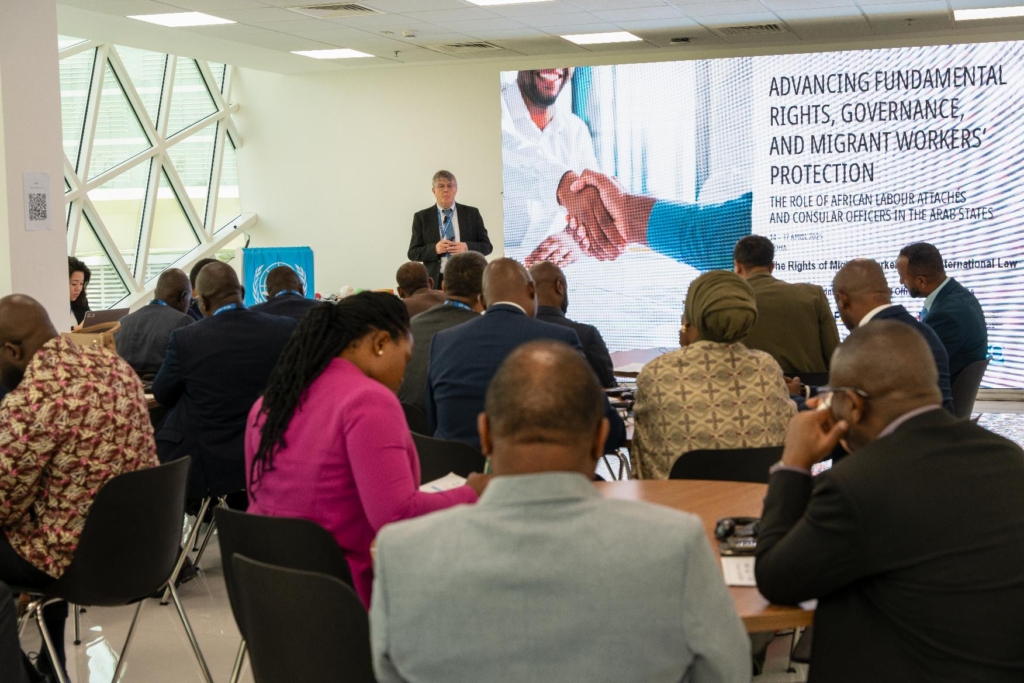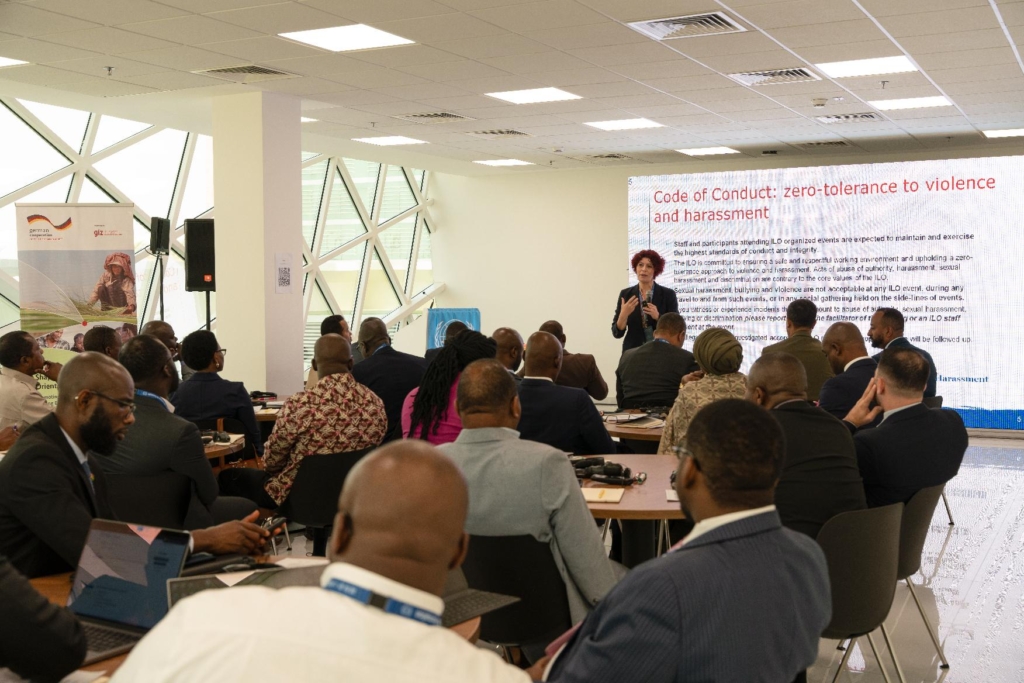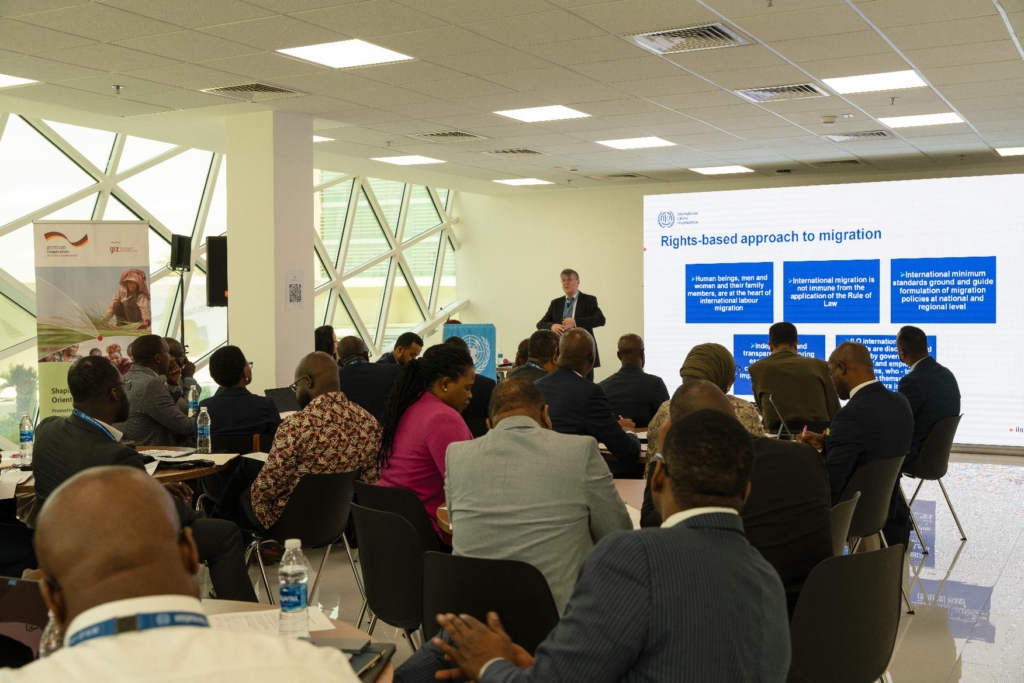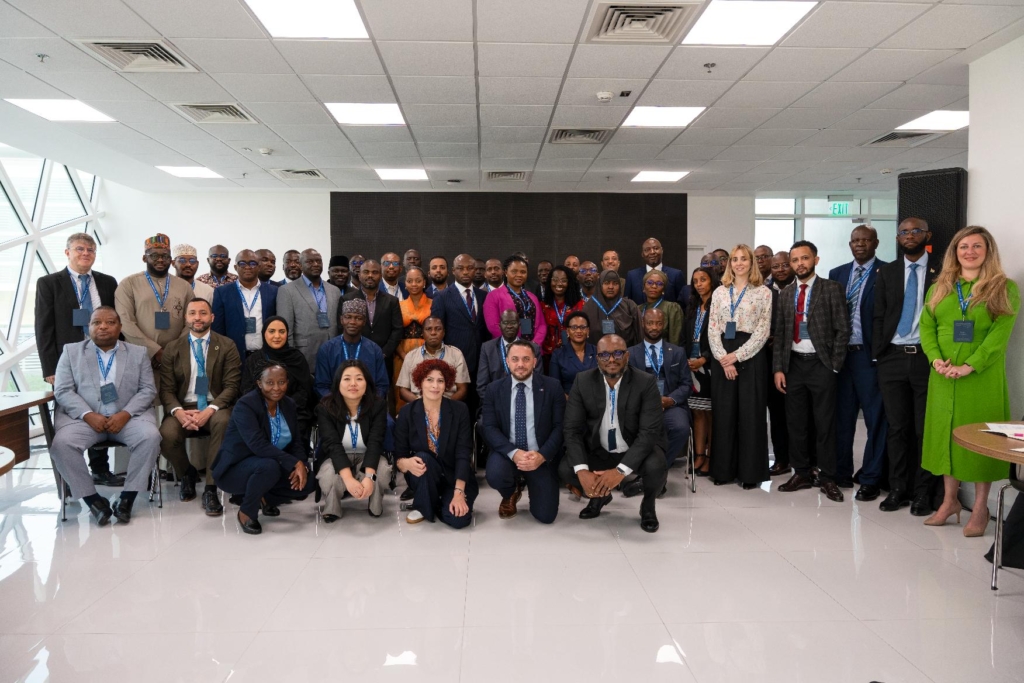Participants at the the Training Programme in Doha .
Forty-two (42) Government officials from ten African countries, including Ghana, participated in a four-day training program to enhance protection for their citizens working in Arab states.
The event, held from 14th–17th April 2025 in Doha, Qatar, brought together representatives from Cote d’Ivoire, Djibouti, Ethiopia, Ghana, Kenya, Nigeria, Somalia, South Sudan, Tanzania and Uganda to address systemic challenges faced by African migrant workers, particularly women in domestic roles, who remain vulnerable to exploitation.
The Arab States region has become an important destination for migrant workers. According to the International Labour Organization (ILO), this region has the highest global share of migrant workers as a proportion of the total workforce, reaching 41.4 per cent in 2019 compared to the global average of just 5 per cent. Among these migrants are many African nationals, including Ghanaians seeking better economic opportunities. However, persistent reports on abuse, exploitation and inadequate working conditions, especially domestic workers highlight the urgent need for strengthened protection mechanisms.
Unlike many Asian countries with longstanding labour migration systems and bilateral labour agreements in place, many African countries are still in the early stages of building institutional frameworks to manage labour migration and ensure migrant worker protections.

Diplomatic missions play a critical role in in this regard, serving as first responders in addressing labour disputes, offering consular support, and facilitating access to justice. So far, few African countries have been working to enhance their diplomatic missions by appointing Labour Attachés specialised in labour and employment issues, including addressing the challenges faced by migrant workers. While Ghana has made strides in offering advisory and support services to labour migrants, particularly those in vulnerable situations, it has yet to deploy Labour Attachés to its diplomatic missions.
To strengthen diplomatic missions in dealing with migration issues, Ghana’s Ministry of Foreign Affairs, together with the Ministry of Labour, Jobs and Employment, International Labour Organisation (ILO) and the Deutsche Gesellschaft für Internationale Zusammenarbeit (GIZ) GmbH jointly organised a four-day training for representatives from African countries, including Ghana. The training was organised under the theme “Advancing Fundamental Rights, Governance, and Migrant Workers’ Protection – The Role of African Consular Officers and Labour Attachés in the Arab States.”

In his welcome speech, David Nii Addy, Director of the Global Programme “Shaping development-oriented migration” (MEG), commissioned by the German Federal Ministry of Economic Cooperation and Development (BMZ) acknowledged the vital contributions of migrant workers and Africa’s diaspora to international development in the Arab world and beyond, while also stressing their vulnerability, particularly for women in domestic and care work, where risks of exploitations are high. “That’s why we should collectively strive to advance fundamental rights, strengthen labour migration governance and protect migrant workers.” He emphasized that achieving these goals required coordinated action from governments, international organisations, civil society, the private sector and migrant communities.
The four-day training provided comprehensive capacity building on key areas critical to effective labour migration management and governance. The topics included fair recruitment practices, collaboration with local governments, pre-departure training, monitoring compliance with international labour laws and standards. Particular attention was given to the specific vulnerabilities of African migrant workers, especially women, and to addressing complex grievance mechanisms, access to justice and effective remedy.

In the absence of Labour Attachés, Ghanaian Consular and Diaspora Desk Officers were engaged to ensure continued institutional support for migrant workers abroad.
A handbook based on the training is currently being developed to support and strengthen the staff of African diplomatic missions. This will ensure the continuity of knowledge sharing beyond the onsite participants.
Insights from Training Participants
Sarah Asare Opokua, Ghana Embassy, Qatar – “Prior to this training, I did not consider networking with host authorities and stakeholders in destination countries of migrant workers as a vital tool in tackling the abuse of migrant workers’ rights. The training gave me an important insight into networking opportunities and will enable me to tackle problems/issues more timely and effectively in future.”
Nana Yaa Boatemaa, Ministry of Foreign Affairs, Ghana – “Participating in this training was a profoundly eye-opening experience that shed light on the often-overlooked struggles of migrants. It not only deepened my understanding, but also touched me on a personal level, fostering a greater sense of awareness for the journeys and struggles migrants are going through.”
Henry Agyekum, Ghana Embassy, Berlin – “The training gave us the opportunity to exchange and learn from experiences of other African countries with [Bilaterial Labour Agreements] BLA’s, Ghana could also explore such options with Germany.
Peter Okoe Agoe Allswell, Ghana Embassy, Cairo – “Migrant workers don’t need to be treated specially, they just need to be treated with respect and dignity.”
Ishmael Opare, Ghana Embassy, Libya – “All migrant workers have to have access to a fair justice system.”
meg-comms@giz.de.

About Programme “Shaping development-oriented migration” (MEG)
MEG assists its partner countries to leverage the benefits of regular migration and engage diaspora for sustainable development. In is currently active in 14 partner countries, namely: Albania, Cameroon, Colombia, Ecuador, Ethiopia, Georgia, Ghana, India, Kosovo, Nepal, Serbia, Tunisia, Ukraine and Viet Nam. For more information, please visit https://bit.ly/46olLPi
About GIZ
GIZ has over 50 years of experience in a wide variety of areas, including economic development and employment, energy and the environment, and peace and security. GIZ works with businesses, civil society actors, and research institutions, fostering successful interaction between development policy and other policy fields and areas of activity.
The German Federal Ministry for Economic Cooperation and Development (BMZ) is GIZ’s main commissioning party. Currently, GIZ promotes sustainable development in Ghana via about 50 programmes and projects. GIZ’s activities cover three priority areas: Energy and Climate, with a concentration on renewable energy and energy efficiency; Training and Sustainable Growth for Decent Jobs, and Peaceful and Inclusive Societies, which looks at good governance. For more information, please visit www.giz.de/ghana.
DISCLAIMER: The Views, Comments, Opinions, Contributions and Statements made by Readers and Contributors on this platform do not necessarily represent the views or policy of Multimedia Group Limited.
DISCLAIMER: The Views, Comments, Opinions, Contributions and Statements made by Readers and Contributors on this platform do not necessarily represent the views or policy of Multimedia Group Limited.